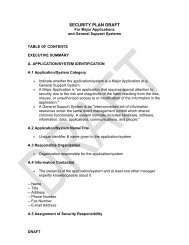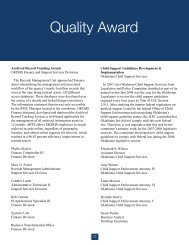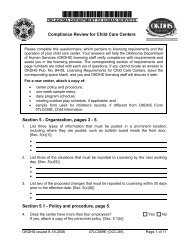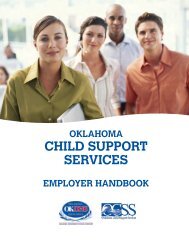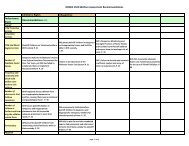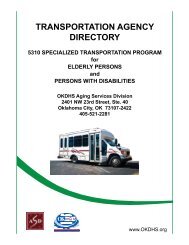The Oklahoma Pinnacle Plan - Oklahoma Department of Human ...
The Oklahoma Pinnacle Plan - Oklahoma Department of Human ...
The Oklahoma Pinnacle Plan - Oklahoma Department of Human ...
You also want an ePaper? Increase the reach of your titles
YUMPU automatically turns print PDFs into web optimized ePapers that Google loves.
<strong>The</strong> <strong>Oklahoma</strong> <strong>Pinnacle</strong> <strong>Plan</strong>:<br />
An Improvement <strong>Plan</strong> for Child Welfare Services<br />
March 2012<br />
9. By July 1, 2013, OKDHS will hire or contract with licensed clinical pr<strong>of</strong>essionals to<br />
provide the training, consultation and on-going support necessary to embed traumafocused<br />
practice into the agency culture and to support staff in making difficult<br />
decisions about specific cases.<br />
10. OKDHS will request an additional 100 child welfare specialist positions, additional child<br />
welfare supervisors and district directors. This request will be contingent upon<br />
additional funding by the state legislature and approval <strong>of</strong> the Secretary <strong>of</strong> Health and<br />
<strong>Human</strong> Services.<br />
11. OKDHS will conduct a workload study to determine the appropriate number <strong>of</strong> CWS<br />
positions needed in <strong>Oklahoma</strong> and consider a reasonable turnover rate. This study will<br />
either confirm the right number <strong>of</strong> CWS are employed or provide the basis for future<br />
requests for CWS and supervisors.<br />
12. By September 1, 2013, OKDHS will create a field training program with intensity <strong>of</strong><br />
supervision by tenured staff and the requirement for new CWS to demonstrate<br />
competencies before working independently, similar to the intensity and requirements<br />
<strong>of</strong> training <strong>of</strong>fered to new law enforcement <strong>of</strong>ficers.<br />
13. By September 1, 2013, OKDHS will develop and implement a certification program for<br />
CWS.<br />
14. By September 1, 2013, the <strong>Oklahoma</strong> <strong>Department</strong> <strong>of</strong> <strong>Human</strong> Services will develop and<br />
submit for approval to the Office <strong>of</strong> Personnel Management (OPM) Division <strong>of</strong> the<br />
Office <strong>of</strong> State Finance (OSF) a new administrative support job family for CWS. If the<br />
newly developed job family is approved by the OPM Division <strong>of</strong> OSF, OKDHS will assign<br />
one position <strong>of</strong> the newly developed job family for every two child welfare supervisory<br />
units.<br />
Year Three (SFY 2015)<br />
15. After the workload study is completed in Year Two, OKDHS will make adjustments to<br />
the tracking system so that all assigned work is counted, staff experience and turnover<br />
is considered, and the complexity <strong>of</strong> cases is evaluated.<br />
16. By September 1, 2014, OKDHS will eliminate the use <strong>of</strong> secondary assignments for<br />
visiting children statewide except in unusual circumstances; for example children<br />
placed out <strong>of</strong> state or placed further than two hours from their primary county.<br />
17. By September 2014, OKDHS will double the number <strong>of</strong> slots available for child welfare<br />
staff, from 24 to 48, to attend the Interdisciplinary Training Program in Child Abuse and<br />
Neglect. This program is a graduate level course <strong>of</strong>fered through the University <strong>of</strong><br />
<strong>Oklahoma</strong> Health Sciences Center. If selected, child welfare staff can attend at no cost;<br />
however, they are responsible for the tuition if they are interested in graduate level<br />
college credit. Child Welfare Practice Enhancement Program (CWPEP) student’s tuition<br />
is covered through the CWPEP.<br />
18. OKDHS will pilot the concept <strong>of</strong> partnering workers in teams to improve safety,<br />
decision-making, support to families, case information provided to the supervisor, and<br />
stress associated with making very tough decisions. Although this is called teaming in<br />
some jurisdictions, OKDHS will develop a format and structure <strong>of</strong> its own.<br />
17





